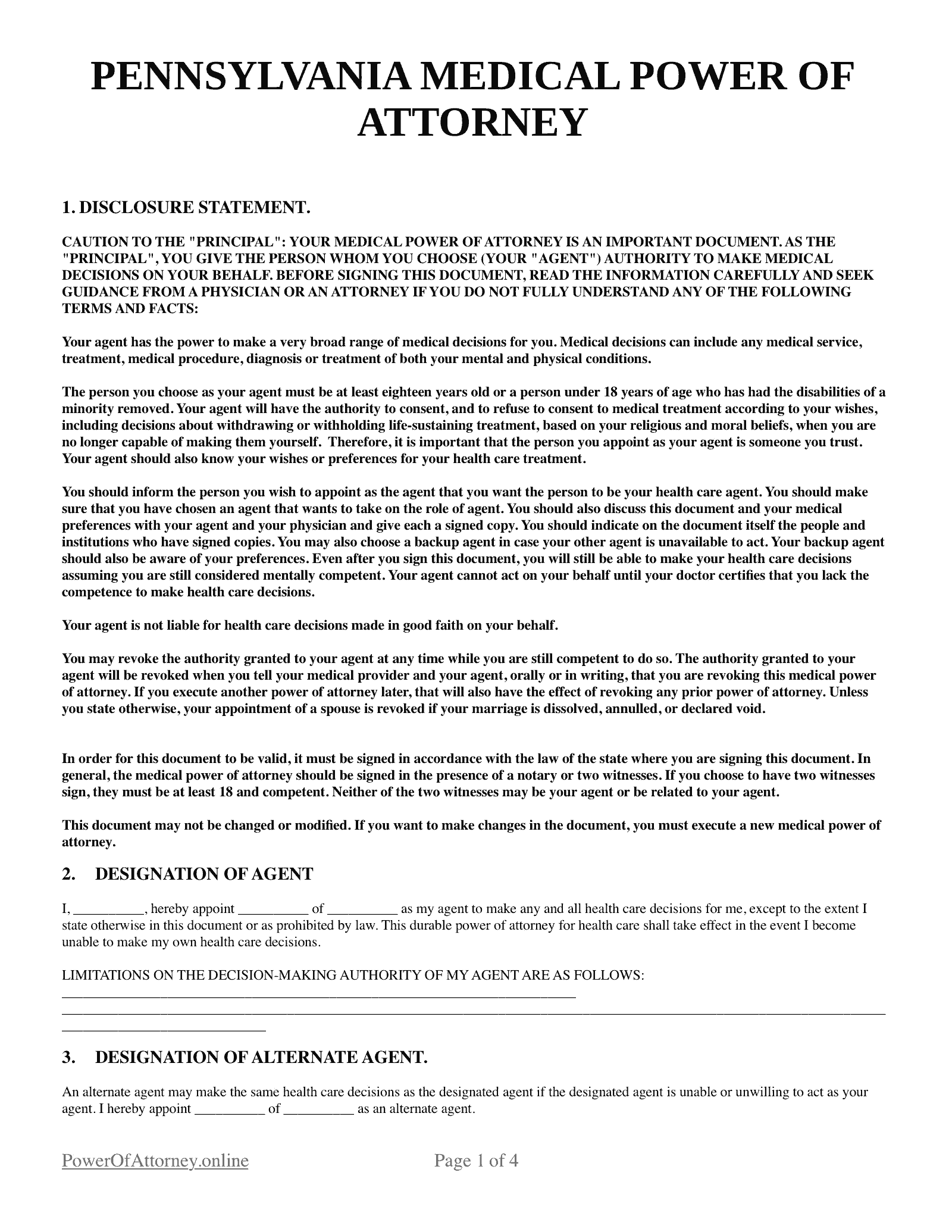Free Pennsylvania Medical Power of Attorney Forms
A power of attorney authorizes an individual, known as an agent or attorney-in-fact, to make financial decisions on behalf of the individual (the principal) who creates the POA form.
A medical power of attorney form works similarly however, the agent is put in charge of medical decisions, including deciding on end-of-life treatment.
An MPOA form grants an agent permission to make healthcare decisions on the principal’s behalf if they become incapacitated.

Pennsylvania Medical Power of Attorney Laws
To create a Pennsylvania medical power of attorney, it is necessary to follow all relevant acts and legal requirements.
The statutes that determine these requirements can be found in Chapter 54 of the PA General Assembly.
- Advance Health Care Directive: “A health care power of attorney, living will or a written combination of a health care power of attorney and living will.” The section (§ 5422) defines what an advance health care directive is in Pennsylvania.
Signing Requirements in Pennsylvania
Medical power of attorney signing requirements vary by state.
In the state of Pennsylvania, both the agent and principal must sign the document in the presence of two witnesses.
According to section 5452 of the PA General Assembly (§5452), each witness must be at least 18 years of age.
The two witnesses cannot be:
- Anyone who has signed an MPOA on behalf of or under the instruction of the principal.
- A healthcare provider or agent who provides the principal with medical services.
Once the document is signed by both parties and by the witnesses, it will have met the Pennsylvania state MPOA signing requirements.
It is not obligatory in Pennsylvania to have your medical power of attorney notarized. However, having the document acknowledged by a notary public can add to its legitimacy.
How to Write a Medical POA in Pennsylvania
To ensure that your Pennsylvania medical power of attorney preferences will be followed, you must correctly write your legal document.
Follow the steps below to draft your medical power of attorney form.
Download a Pennsylvania MPOA Template
To draft an error-free document, you should use a printable medical power of attorney template.
By using a template, you will be able to write your document quickly and meet all state requirements.
Appoint your MPOA Agent
You must select your agent, if you haven’t already done so, and list them on your medical power of attorney document. The limitation of their authority may also be included on the form.
The agent should be someone you completely trust to respect your preferences if you end up in a mentally incompetent and unresponsive state.
List the agent’s personal information, including their contact details.
Add Alternate Agents
In Pennsylvania, you can add two alternate agents to your medical power of attorney. This is done in the event your primary agent cannot or does not wish to fulfill their duties.
Ensure to add their personal and contact information as well.
List Your Healthcare Preferences
It’s essential to add the preferences regarding your possible medical treatment. It is especially important to list any end-of-life treatment you would be open to or against receiving.
With this information, your agent and health care provider will know which treatments may be given or rejected, such as the use of a feeding tube.
Add the Necessary Signatures
To have a correctly signed MPOA form, you must include the names of each party as well as the date.
Each party and witness must then sign the document. If you choose to have it notarized, the notary public will include the necessary notarization.
Once all necessary information and signatures are added, the MPOA will be ready to be put into use.